The Samsung 950 Pro PCIe SSD Review (256GB and 512GB)
by Billy Tallis on October 22, 2015 10:55 AM ESTSequential Write Performance
The sequential write test isn't limited to a small span of the disk, as that usually doesn't make a difference for this performance metric. As always, our averages are of the lower queue depths, but scaling to higher queue depths is also investigated. Bulk file copies and recording uncompressed video are the kind of uses that depend on sequential write performance.
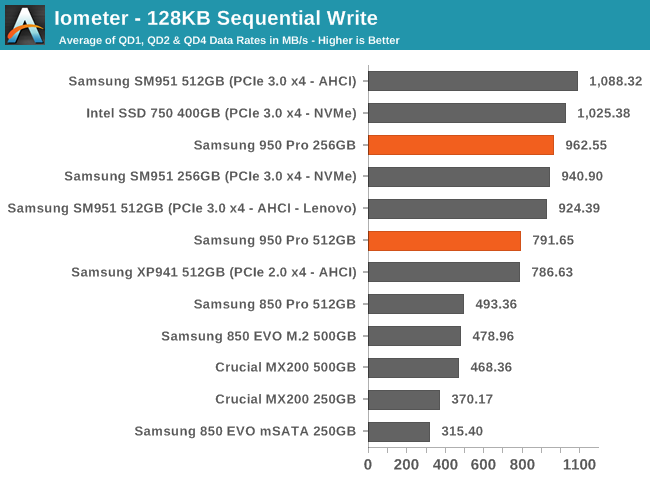
Even at low queue depths, most SSDs can spread a sequential write workload across multiple channels to achieve very high throughput. All of the PCIe drives perform well above the SATA limit but nowhere near the capacity of the PCIe links. The 512GB 950 Pro seems to again be encountering thermal throttling, and more severely than the SM951s we tested.
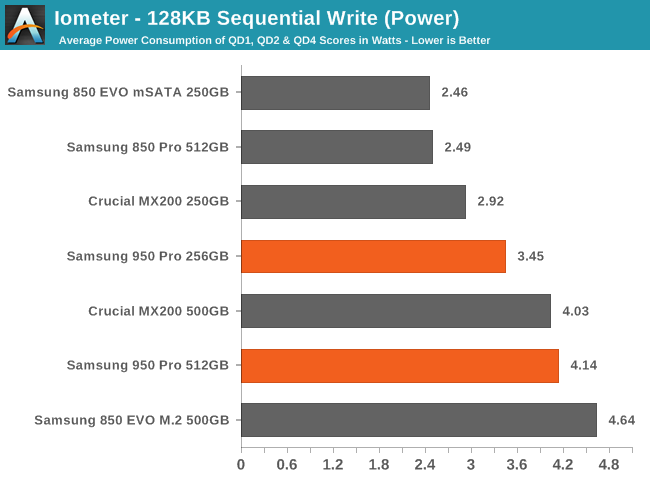
The average power consumption for writes is still on the high side by SATA standards, but is quite reasonable in light of the performance achieved.
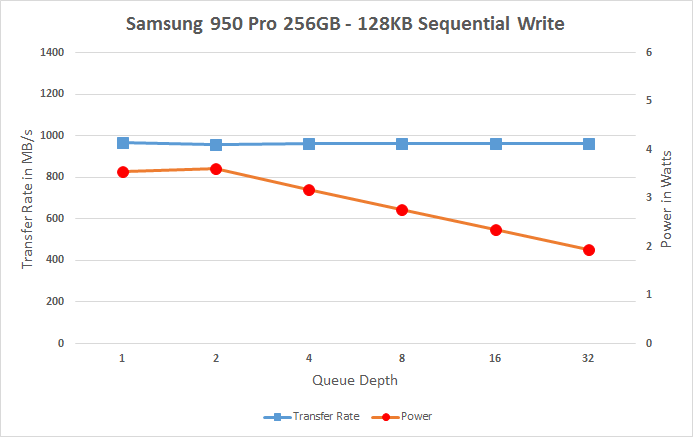 |
|||||||||
Performance across the sequential write test is mostly constant, but power isn't. The declines in power consumption in spite of increased queue depth are again most likely an artifact of whatever background processing is going on in the drive. On SATA drives, it's usually obvious from looking at the power meter when a drive has completed background processing and is truly idle and ready to run the next test, but with the lack of working power management for PCIe drives on our testbed I'm not so sure here. Overall it's probably a good sign that the drives were able to maintain high performance in spite of whatever else was going on, but given more cooling the 512GB can probably do much better.
Sequential Read Performance
Just like the random read test, sequential reads are tested across the span of a full drive and a representative sample of queue depths. Most operations involving large files (typically images and videos) fall under this test's purveiw, but streaming or playing even the highest resolution videos won't be a challenge for any of these drives. Copying files to another SSD or loading a new level in a video game would be more likely to show noticeable difference from better performance here.
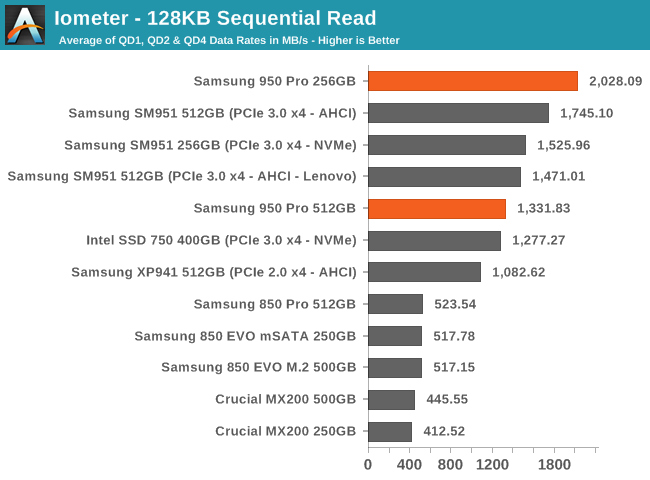
The sequential read performance is probably the best showcase of what the PCIe 3.0 x4 interface can do. The 256GB 950 Pro attains over half of the link speed, but the 512GB is again bogged down by something—relatively speaking, since it's still more than twice the speed of SATA and faster than even the Intel SSD 750. It's possible that the 950 Pro isn't faithfully implementing the secure form of the NVMe format command and some lingering fragmentation is preventing the 512GB drive from performing as specified. Read operations require less power to be supplied to the flash chip than for writes, but if the thermal throttling is all in the controller it could be showing up here as well.
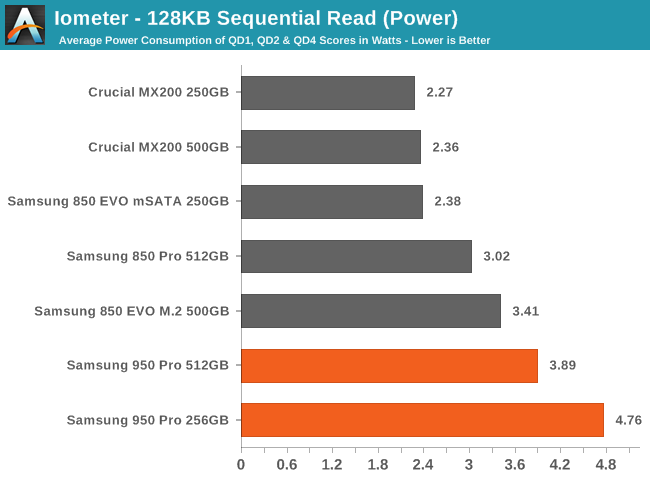
Relative to each other, the 950 Pro's power consumption is in line with the performance they're demonstrating, and proportionally much better than the SATA drives.
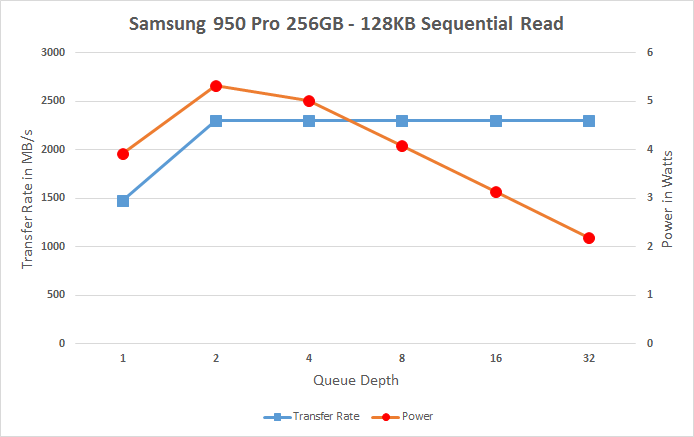 |
|||||||||
At queue depth 1, both of the 950 drives are performing similarly. When moving to higher queue depths the 256GB immediately hits 104% of its rated speed, but the 512GB doesn't improve any. (It's worth noting the differing scale for Transfer Rate in the graphs above.) The puzzling decline in power consumption at higher queue depths shows up again on the 256GB and definitely warrants deeper investigation.










142 Comments
View All Comments
Gigaplex - Thursday, October 22, 2015 - link
What you're proposing isn't actually booting the drive. It's chainloading. The assessment is accurate, and chainloading is a long standing practice for this type of problem. It's also a hack that has no business being used for general consumer usage.R3MF - Thursday, October 22, 2015 - link
does the supplied samsung driver work with Win7, and is its use as simple as pointing the windows installer to a USB thumbdrive at the appropriate point?Billy Tallis - Thursday, October 22, 2015 - link
The Samsung NVMe driver was provided as an installer program. After running the installer, there was no need to explicitly change which NVMe driver was used for the 950 Pro. I tested it on Windows 7, 8.1, and 10.Badelhas - Thursday, October 22, 2015 - link
I have a Vertex 3 128GB SSD. Do you guys believe I will see real world gains if I upgrade to the Samsung 950 Pro 256GB?MrSpadge - Thursday, October 22, 2015 - link
If your usage is "normal" for a desktop, I suspect "no" is the answer. Unless you're doing a side-by-side comparison. Watch the disk drive LED on your machine. If it's glowing constantly you're being limited by the storage, otherwise not. Or look at the drive load in task manager (shown since Win 8).III-V - Thursday, October 22, 2015 - link
>For starters, the 950 Pro's power consumption increases as it heats up, and I've seen its idle power climb by as much as 4.5% from power on to equilibrium.Er, yeah, that's how typical transistors work... they get leakier as they heat up :\
boogerlad - Thursday, October 22, 2015 - link
What is the latency difference between having this ssd connected directly to the cpu, and through the pch? I'm very curious but no one has tested this.TelstarTOS - Thursday, October 22, 2015 - link
Performance is a bit of a mixed bag, but price/perf ratio is great.Waiting for intel countermove now :)
DIYEyal - Thursday, October 22, 2015 - link
Does it suffer from similar thermal throttling issues as it's predecessors (SM951 and XP941)? I have seen people putting a heat sink on these and they report improvement in sustained performance.theMillen - Saturday, October 24, 2015 - link
http://www.legitreviews.com/samsung-ssd-950-pro-51... will answer any heat throttling questions you have, ie yes! but a simple fan solves them :-p